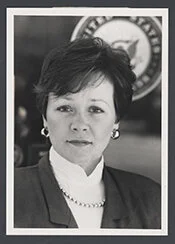It is never easy to be the first to crack the ceiling of any economic, government, or social organization. In 1986, Jill Long Thompson became the first woman in Indiana to win a major party’s nomination for US Senate. She hasn’t always been victorious, but that initial victory set the stage for women of any party to represent the state in Congress.
Thompson was born Jill Lynette Long on July 15, 1952, in Warsaw, Indiana. She was the middle child, with both an older and a younger brother. Her father and grandfather were farmers, and her mother worked both in a factory and as a professional cleaner. Thompson says that both her parents taught them how to do everything on the farm while encouraging them in school. Both of her parents were lifelong Democrats.
She became the first person in her family to earn a college degree, a B.S. in business administration from Valparaiso University in 1974. Then she went on to earn two advanced degrees at Indiana University, an M.B.A. in 1978 and a Ph.D. in marketing with minors in statistics and social psychology in 1984. These academic achievements heralded a much deeper scholarly and political life.
Thompson won her first political race in 1983 to become a member of the Valparaiso City Council from 1984 to 1986. She served on the council while running her family farm and teaching at Valparaiso University. Thompson has described campaigning at this time as “fun,” because she got to meet people going door-to-door, something that can be scary not only for candidates but also for volunteers trying to get people registered to vote and to the polls. She was also inspired to run because of the agricultural crisis developing in the nation at that time, an economic struggle that affected her parents.
As she herself would point out, she would be the fourth woman from the state to serve in Congress. While some history sites and publications claim that she was the first woman in Indiana to win a US Congressional primary for one of the major parties, this does not appear to be correct, because Virginia Ellis Jenckes also won the Democratic primary for US House in 1932, followed by Cecil Murray Harden’s winning the Republican primary in 1948. Thompson’s correct distinction should be that she was the first woman to win a major party’s primary for a US Senate seat in Indiana.
Thompson has won every primary she’s run in, but winning the statewide election has been more challenging. In total she has won a total of seven Democratic primaries, for US Senate, the House of Representatives, and even the governor’s race. Her strongest victory was in 1990, when she won the primary with over 94% of the vote; her weakest primary showing was in 2002, when she got just over 52% in the Distßrict 2 primary. It has been a struggle to turn those primary picks into wins, however, with five losses and three victories in general elections, including becoming the winner of the District 4 special election to replace Dan Coats in the US House of Representatives in 1989 and then winning the following two regular House elections. These were important victories, because that district had been a GOP stronghold for decades, but she ran as a conservative or blue-dog Democrat.
While in Congress, Thompson served on the Agriculture Committee, promoting incentivizing conservation of the environment and fair practices, and on the Veterans’ Affairs Committee, where she fought for better healthcare, including hospice care and treatment for PTSD (post-traumatic stress disorder). She routinely opposed spending increases, including raises for Congress, as well as the move to allow President George H.W. Bush to use force during the Persian Gulf War in 1990. In 1993, she proposed the Congressional Ethics Reform Act, a tough sell given the difficulty in getting any organization to self-regulate. You may learn more about her time in Congress at this website.
After being swept aside with the elections of 1994, she became a Fellow at the Institute of Politics at the John F. Kennedy School of Government at Harvard University for a short time before being appointed Undersecretary of Agriculture in 1995 by President Bill Clinton. From 1995 to 2001, when the GOP won the presidency, she was Undersecretary for Rural Development. It was in 1995 that she married her husband, Don Thompson, and took his family surname as her own.
After 2001, Thompson split her time between teaching at Manchester College and Indiana State University, both in Indiana, and running for the House once more in 2002. From 2003 to 2007, she was CEO and Senior Fellow at the National Center for Food and Agricultural Policy, headquartered in Washington, D.C. In 2008 she became the first woman to win a major party’s primary to run for the office of governor. She lost to incumbent Mitch Daniels. While she may not have won either her Senate or gubernatorial runs, she is correct that doing so “advanced opportunities for girls and women.” Since her runs, women have begun to win more elections in the state of Indiana.
In 2010 she was appointed to the Farm Credit Administration Board by President Barak Obama, then confirmed by the Senate six months later. She worked at the FCA until 2015, serving as CEO and Board Chair from 2012 to 2014. She has remained active in politics through publications and service to the party and other candidates. She taught ethics at Indiana University in Bloomington from 2015 to 2020 at the Kelly School of Business and the O’Neill School of Public and Environmental Affairs. In 2017, she joined the board of directors for The Conservation Fund and still serves in 2021. Her 2020 book The Character of American Democracy looks at the history of democracy in the USA as well as challenges to its survival. Currently she is a visiting scholar with SPEA’s Ostrom Workshop, at Indiana University in Bloomington.

